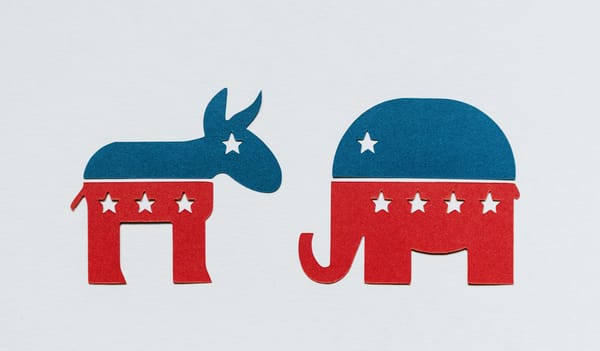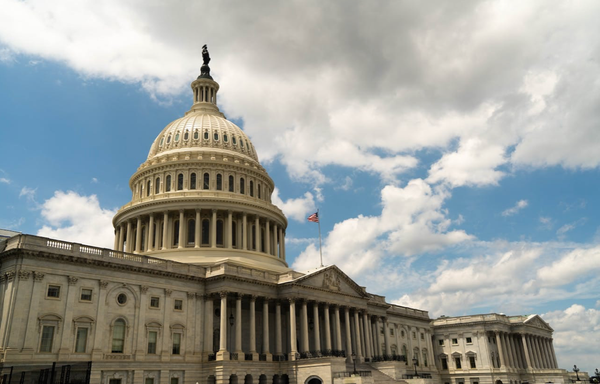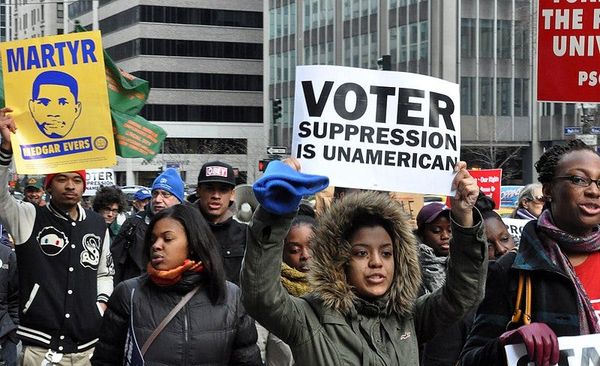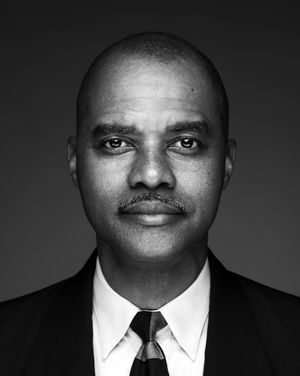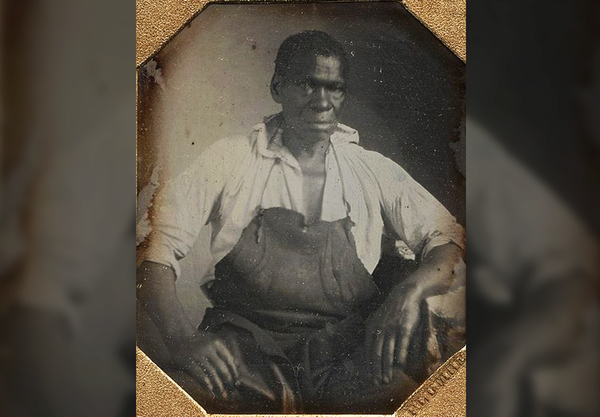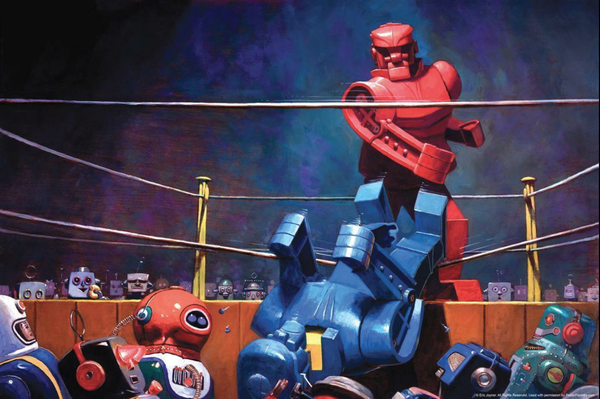A saying maintains that there are two things one should never discuss in polite company: religion and politics. It’s true. Americans traditionally hate politics. We like to live in a world where we get along with each other, one in which we can enjoy picnics and softball together, without regard for our political bent or religious beliefs.
Or at least that’s how it used to be. Lately, politics has devolved into a blood sport, with supporters vehemently defending their own side, right or wrong. We know this doesn’t feel right, but we just can’t stop ourselves. Is it possible that there is something bigger at play here? Is it possible that our current political crisis is about something more than just who’s winning and who’s losing?
Government is the ultimate expression of the social contract that governs our society. The theory of the social contract comes from the Enlightenment of the late eighteenth and early nineteenth centuries. Based upon the arguments of Jean-Jacques Rousseau and Thomas Hobbes, the idea emerged to answer the question of “what makes a government legitimate?” The philosophers of that era were no longer willing to accept the justification of rulers who came before, in effect that God granted certain people the right to rule over the rest of us. Instead, they needed a new understanding of government.
In its place, the Enlightenment philosophers proposed the idea that people would consent to their government. In effect, society would collectively enter into a contract in which its members agreed to be governed according to certain principles. Why would society agree to this? According to the philosophers, because it would deliver safety, security, stability, and prosperity to all. Without some organizing principle, society would devolve into violence and chaos, something that nobody wants. So, to avoid this result, we would agree to cede certain of our rights to a common enterprise, a government, that would enforce the rules society agreed upon against the few who refused to cooperate.
This theory requires the acceptance of a few assumptions to work. First, it requires that most people are willing to accept the legitimacy of their government institutions. If even a substantial minority of society does not recognize their authority, then the state will be unable to compel those people to accept the rules we have established. Second, it requires that the rich and powerful have a stake in society. If the people who have power believe they are better off with our Constitutional order than without it, they will support it. If not, they will have the power to undermine its existence.
America’s Founding Fathers were strongly influenced by this Enlightenment philosophy. They built our governmental, economic, and social systems around those beliefs. You can see its manifestation in the first three words of our Constitution: “we the people.” With those words, the Founding Fathers were stating that we as a society were consenting to the establishment of a government that would “establish Justice, insure domestic Tranquility, provide for the common defence, promote the general Welfare, and secure the Blessings of Liberty to ourselves and our Posterity.”
Politics is the process of society as a whole negotiating how our limited resources will be divided between the few versus the masses.
Our system is based upon two assumptions that have created a tension that has existed throughout our history. On the one hand, government must maintain the support of a supermajority of everyday Americans. On the other hand, it must provide sufficient benefits to the wealthy and powerful, the very people who could buy themselves some of the protections that government would otherwise provide to society as a whole, to retain their support. Thus we have a tension between providing benefits to the few as well as to the majority.
As any economist would tell you, resources are limited. As a result, even though our society’s goal is always to make the pie bigger, how the pie gets divided between these two groups is where politics comes in. Ultimately, politics is the process of society as a whole negotiating how our limited resources will be divided between the few versus the masses.
In this struggle, the few are always going to have certain advantages. First, they have resources, financial and otherwise, that can be used to influence others. Second, they have the time and interest in being involved in determining the outcomes of political action. There is an idea in political science called rational ignorance. In effect, most people don’t have the time to become fully educated about what’s going on in government, and they have even less time to try to impact it. Most people are busy with their jobs, raising their families, just trying to get by. But the wealthy have both time—either their own or the ability to buy the time of people to represent them—and an interest in impacting government. They understand, after all, that by influencing government, they can manipulate it to give them a bigger piece of the pie.
What the wealthy lack in their mission to control the government is numbers. As a result, they recruit people to their side, people who, for the most part, will not benefit from the narrow policies they enact. How do they do this? By convincing one part of the masses that they have something to lose to the other part of the masses.
Consider slavery. This institution directly benefited very few people in the antebellum South. There was a small group of very wealthy landowners who relied upon an enslaved, Black workforce to harvest their crops. But this super-wealthy group was not numerous enough to support such an all-encompassing institution. Certainly, it was not enough to convince a nation to go to war to protect it. So somehow, this small group had to build support among enough others to grant their goals legitimacy.
To do so, the rich white Southern establishment engaged in three tactics. First, it allowed for an upper-middle-class white population to own one or two enslaved people. While their livelihood did not rely upon large bands of slaves the way the very rich did, their ownership was viewed as a sign of wealth and prosperity, and their fear over losing that status bound this group to the very wealthy. Second, the wealthy convinced another group of white Southerners to aspire to the ownership of slaves. They wanted to join that group that had the signs of prosperity, and so supported the institution that allowed it. Finally, the powers that be convinced a group of relatively poor white Southerners that even though real prosperity was out of reach, at least they were better off than the Black people. With the support of those three groups, the wealthy whites who benefited most from the institution of slavery generated a sense of legitimacy for the societal rules and norms that perpetuated it.
Left unchecked, however, the very wealthy will take more and more of the pie until the groups who have supported their policies realize the extent to which they have not benefited from the system. When that happens, you see a backlash that pushes society back to maintain its legitimacy with the mass population.
That backlash was expressed with regard to slavery in a number of ways. First of all were the Southern states that refused to go along with Secessions, such as West Virginia, Delaware, Kentucky, Maryland, and Missouri. Second were regions that did not support their state’s secession, such as Eastern Tennessee. Finally was the Civil Rights movement in the 1950s and 1960s.

Wait . . . what?
The reality is that for all intents and purposes slavery did not end in the South with the end of the Civil War. It took another hundred years before the substantive enslavement and subjugation of Black people would finally be addressed in any serious way. The result of the rebellion against society’s acceptance of Jim Crow slavery was the passage of the Civil Rights Act of 1964 and the Voting Rights Act of 1965. While those changes angered many who were highly invested in the old order, Black people were finally given a piece of our nation’s overall pie in an effort by the government to maintain its legitimacy.
This is not the only example of our government changing to maintain its legitimacy among the masses. The very rich enjoyed the 1920s, the era of Gatsby, and benefited from their highly unequal share of America’s prosperity. The masses were willing to support their excesses as long as they could either get a small piece of the prosperity; aspire to get a small piece of the prosperity; or remain better off than other groups who looked different from them. With the Great Depression, however, all that came falling apart. The result was the New Deal, a recalibration toward the needs of the masses if ever there was one. Some historians argue that President Franklin Delano Roosevelt was actually a Conservative since his reforms saved the system from collapse due to a loss of legitimacy or a loss of support from the masses. Something had to be done to maintain their belief in the American ideal, and the New Deal was designed to accomplish that goal.
The goal of the very rich is to distract the masses from this necessity, because their wealth has made it possible for them to live with minimal dependence on our community
In some respects, our current political predicament is comparable. The Great Recession of 2008-2009 pointed out to many Americans that the very wealthy were making out like bandits to the detriment of the rest of us. Unfortunately, President Barack Obama was unable to take the radical steps President Franklin Delano Roosevelt took to regain the support of the masses for our institutions. The result has been the seething anger and frustration, both on the right and the left, that characterizes our current political crisis. With current wealth inequality at levels matching those of the 1920s, it is time for another adjustment to retain the support of the masses. Without such an adjustment, our way of life risks collapse.
That is why the 2024 elections are so momentous. Stepping back from the daily chaos of our current politics, it is worth noting that our societal infrastructure needs to regain its legitimacy. People have lost faith in the system, and so one of the prerequisites of the social contract—retaining the support of a majority of the people—is undermined. The goal of the very rich is to distract the masses from this necessity, because their wealth has made it possible for them to live with minimal dependence on our community, thus sabotaging the other assumption necessary to our social contract: the requirement for the rich and powerful to feel a part of our society. If the founders’ grand experiment fails, the One Percent with their resources will be able to pay for their own security, education, and even flee the country if need be, leaving the rest of us to our own devices.
If the next administration can change the dynamic by addressing the serious issues facing the masses and in so doing prop up our institutions, there will be two benefits. The first would be a new faith in this grand experiment in democracy on the part of the masses, much as such a change occurred with the New Deal. The second would be the reinvestment of the very wealthy in our uniquely American social contract, since a successful and prosperous America is a good place to be, even for the very wealthy. That is the choice that faces us in 2024. I believe the American people are up to it.
Originally published in OHF Magazine Issue No. 1.



